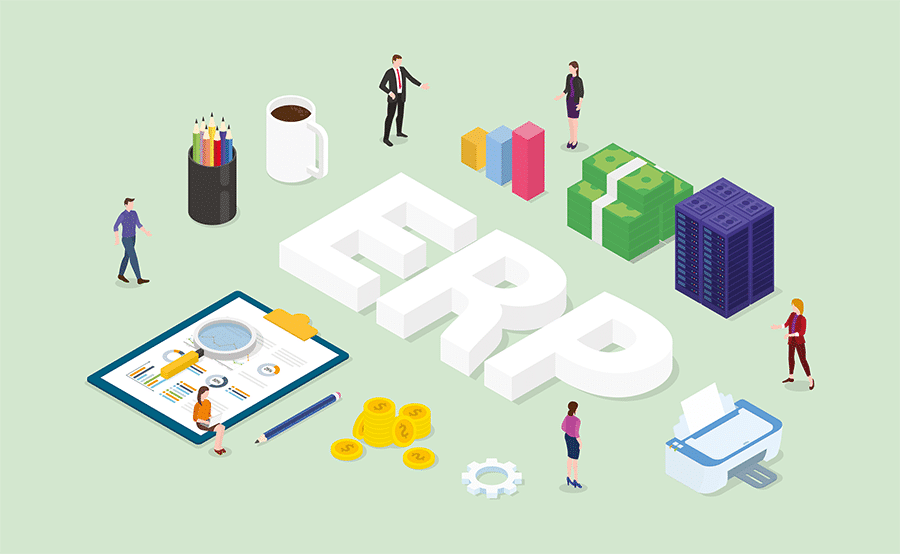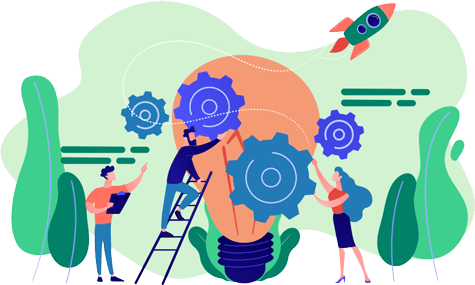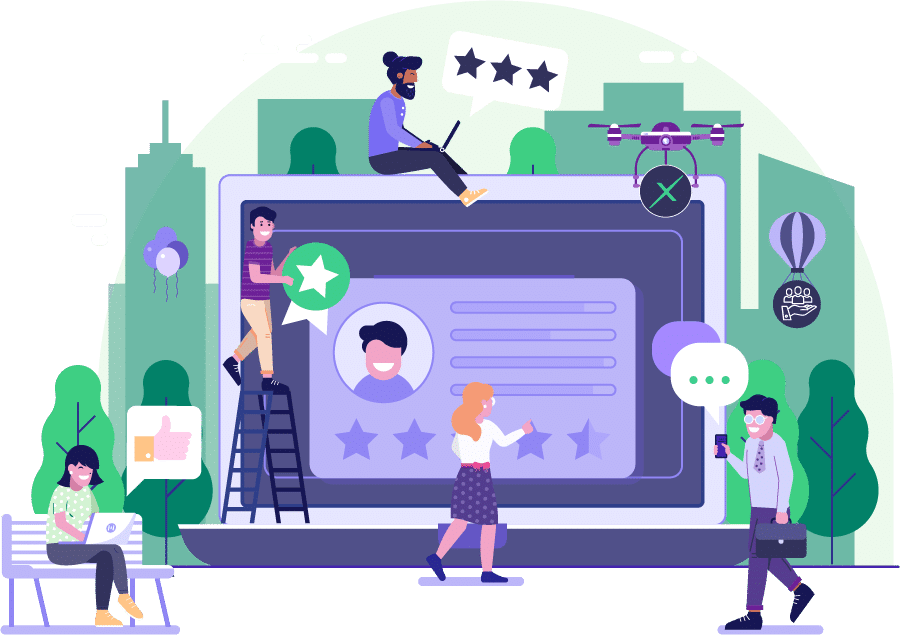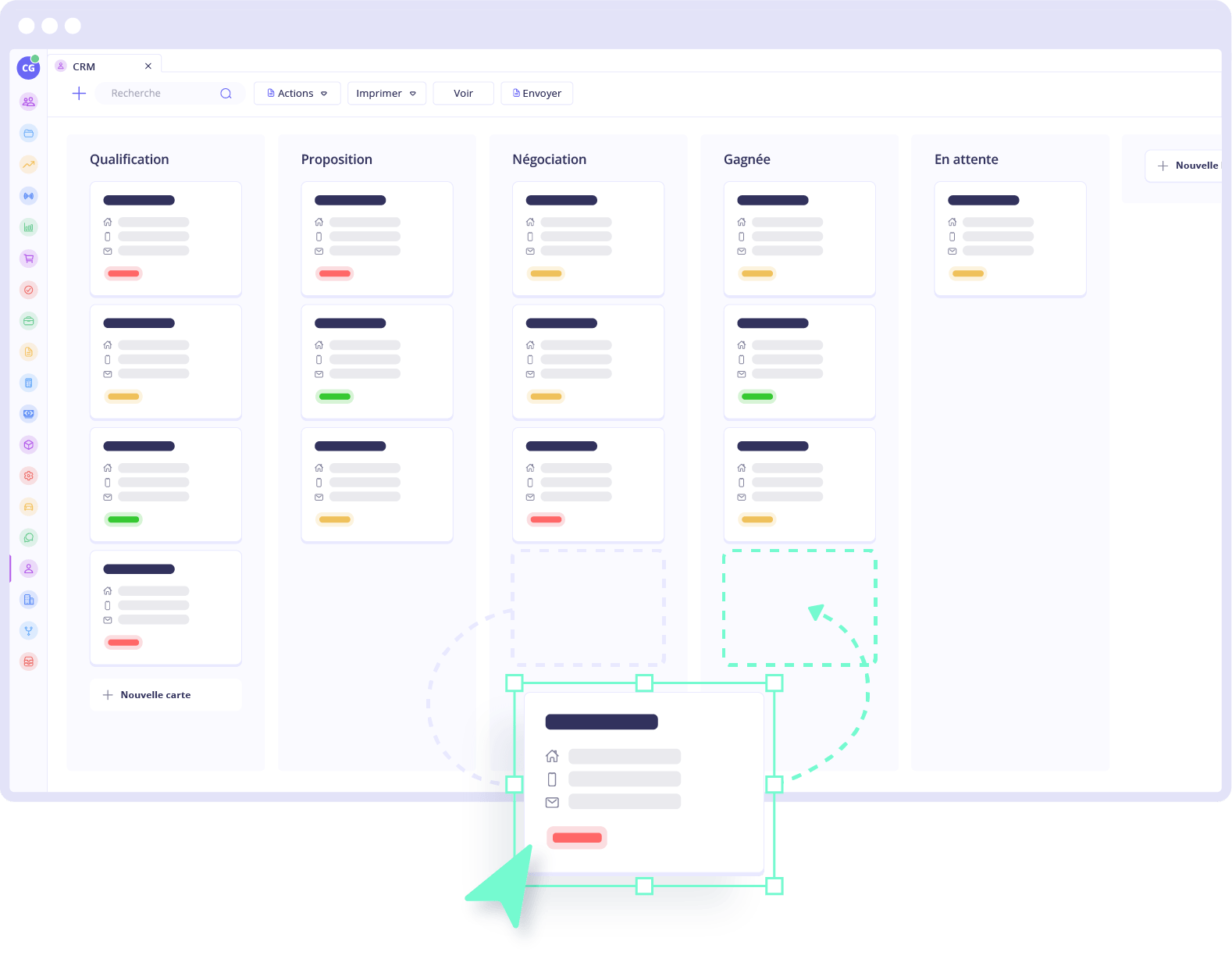ERP vs CRM
ERP vs CRM: What’s the difference between ERP and CRM software?
When you’re looking at different business management software options, it can be hard to know which tool to choose. It’s important to understand the specifics of these different software packages before making a decision.
On this page, discover the differences between the acronyms ERP and CRM.
What is ERP?
ERP is enterprise resource planning software. It enables complete management of an organization’s processes through various business applications.
Installing an ERP is a key tool in managing your growth project.

What are the main functionalities of an ERP solution?
ERP offers a wide range of functionalities that are real advantages when it comes to improving processes between departments. One of the main advantages of this type of software is the number of modules integrated directly into the solution, covering all company functions for better information management and sharing. These modules fall into several categories:
• Global Management (ERP, CRM, and BPM)
• Sales Management (Sales, Marketing, Contracts, and Job Management)
• HR Management (Employee Management, Expense Claim, Timesheet, and Fleet)
• Collaborative Work (Social Networking, Projects, and Documents)
• Financial Management (Accounting, Invoicing, and Budgeting)
• Supply Chain (Purchasing, Inventory, Production, and Quality)
Each ERP system offers more or fewer modules. Axelor ERP has more than thirty business modules.
Each module integrates its own functionalities. Take Axelor’s “Inventory Management” module, for example. Within this module, you can manage:
- Your stock entries and exits
- Your products and their traceability
- Internal stock movements
- Automatically manage your delivery and receiving slips
- Your inventories, your minimum stock rules, and automatically generate purchase orders
What are the objectives of ERP?

ERP can quickly become the foundation of a company’s IT management system, thanks to its ability to centralize information. Its main objective is to manage and steer an organization’s activity by providing a 360° view of all its resources.
All the tools provided by an ERP software package enable you to increase productivity, improve management, optimize costs, reduce lead times and expenses, and gain a complete overview of your business.
ERP software is a type of management solution designed to centralize all company processes, based on a single database that is updated in real time.
If you want to simplify the understanding and sharing of inter-departmental data by bringing them together in a single system, ERP is the solution for you. These are key benefits that help to link the different departments in your company.
Discover the benefits of an ERP for accountingkeyboard_return
What is a CRM tool?
CRM (Customer Relationship Management) is a tool for managing customer relationships. CRM software supports companies in prospecting, building customer loyalty and tracking prospects, offers, and sales. It also enables sales processes to be automated for greater efficiency.
They enable sales teams to better manage customer relations, business opportunities and exchanges within a single platform. By improving relationships with prospects and customers, CRM systems help build trust and increase sales.

What are the main CRM functionalities?
CRM has a wide range of functions that can be very useful to many areas of your business. CRM software is mainly used by sales teams, marketing teams, and customer relationship management teams.
Here are just a few of its features:
• Contact management: centralize all your customer data in one place: customers, prospects, contact details, exchange history, documents, etc., access all relevant information immediately.
• Lead management: track your leads from first contact through to sale, and concentrate on the most interesting ones. Lead marketing follow-up is also made easier.
• Opportunity management: pilot your sales pipeline, detect the most promising business opportunities and track their progress in real time.
• Quotation management: transform your opportunities into quotations in just 1 click, generate PDF documents according to templates, and create purchase orders when you've won.
• Event management: schedule calls, appointments, and tasks directly from CRM, and synchronize them with external calendars such as Outlook or Gmail.
• Marketing campaign management: precisely target your prospects and customers according to the criteria you want, and program marketing and emailing campaigns.
What are the objectives of a CRM?

The aim of a CRM is to facilitate prospecting, customer acquisition and customer loyalty.
By centralizing all important prospect and customer data, the aim of a CRM system is to help companies manage their customer relationships.
By analyzing customer data, CRM enables better targeting to optimize marketing actions and gain in efficiency.
CRM is an indispensable tool for automating customer service, boosting profitability, and increasing sales volume.
Sales teams save considerable time and achieve their objectives more quickly.
CRM software offers many advantages for your various departments, and for boosting the various projects in your business.
ERP vs CRM, which to choose?
Before choosing an ERP or a CRM, it’s important to remember that these are essential tools for boosting your organization’s profitability. The question is, what are your company’s needs and priorities?
Indeed, the two systems offer distinct functionalities and objectives:
CRM
- By definition, a CRM (Customer Relationship Management) system specializes in the complete management of the sales cycle.
ERP
- ERP, on the other hand, operates on a much broader perimeter, offering global management of the company's activity. In fact, it can be used to manage the sales cycle and customers, as well as inventory, products, human resources, and accounting to optimize costs. Software packages cover a wider range of activities, less specific but more versatile.
- ERP provides a follow-up of sales prospecting, and enables this to be linked to other company activities and professions, such as human resources management, production, etc.
Whereas CRM is primarily aimed at sales, marketing, and customer service, ERP is aimed at all company departments.
Despite these differences, both solutions have the same objective: to increase productivity by automating time-consuming tasks and centralizing data.
If your organization needs both tools, you can opt for a CRM integrated with an ERP system.
Benefit from CRM integrated with your ERP
Today, many companies consider these two systems to be indispensable, and are therefore considering integrating the two solutions.
One issue then arise:
- Can the two solutions communicate with each other?
The answer is yes.
The advantage of the Axelor platform is that you benefit from an ERP including a CRM. In fact, the solution includes an Open Source CRM that integrates natively with all other modules. This means you can build a complete sales cycle, from prospecting to quotations and invoicing.
The interoperability between these two solutions is powerful, giving you a more complete and coherent view of your company’s activity, and saving you considerable time. There’s no need to duplicate information between two different systems, as data can be easily transferred between CRM and ERP.


In conclusion, despite their differences, ERP systems and CRM work very well together. CRM is the perfect complement to ERP. They enable you to boost your business by increasing your productivity, although each does so in its own way, with its own specific features.
Axelor offers you a full web solution available in ERP Cloud or on-premise.
Powerful, scalable and easy to customize, Axelor’s Open Source ERP is made up of over thirty integrated business applications, offering your company many considerable advantages.